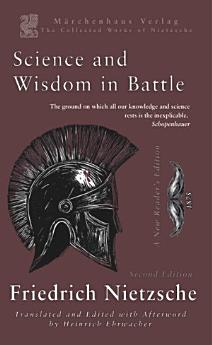Science and Wisdom in Battle: A New Reader's Edition
May 2024 · The Collected Works of Friedrich Nietzsche Book 26 · Marchen Press
Ebook
116
Pages
family_home
Eligible
info
reportRatings and reviews aren’t verified Learn More
About this ebook
"Science and Wisdom in Battle" is an essay that explores the tension between scientific knowledge and philosophical wisdom. Nietzsche argues that while science provides valuable insights into the workings of the natural world, it often neglects the deeper, existential questions that are addressed by philosophy. This short essay is also known as "Philosophy and Truth" in some translations. These writings from around 1875 were not formally published during Nietzsche's lifetime. Instead, they were part of his personal notebooks, which were later compiled and published posthumously. The 1875 manuscript was published posthumously by his sister, Elisabeth Förster-Nietzsche, in 1894. After Nietzsche's mental collapse in 1889 and his subsequent death in 1900, Elisabeth took control of his literary estate.She founded the Nietzsche Archive in 1894, first in Naumburg and later moving it to Weimar in 1896. Around this time, Elisabeth began editing and publishing Nietzsche's remaining unpublished works and notes. The first comprehensive publication of Nietzsche's posthumous fragments, including many of his notebook entries from the 1870s, was part of the series of publications known as the "Großoktav-Ausgabe" that began in 1894 and continued into the early 20th century. These publications often included Nietzsche's notes and unpublished writings, but the editing was sometimes controversial due to Elisabeth's interventions and possible changes. This modern translation from the original manuscript is designed to allow the armchair philosopher to engage deeply with Nietzsche's works. The language is modern and clean, with simplified sentence structures and diction to make Nietzsche's complex language and arguments as accessible as possible. This Reader's Edition also contains extra material that amplifies the manuscript with autobiographical, historical and linguistic context. The edition includes an Afterword by the Translator on the history, impact and intellectual legacy of Nietzsche in context of this work, an index of Philosophical concepts used by Nietzsche with a focus on Existentialism and Phenomenology, a complete chronological list of Nietzsche's entire body of works, and a detailed timeline of Nietzsche's life journey, including the personal relationships which greatly influenced his philosophy.
About the author
Friedrich Nietzsche (1844-1900) was a watershed German philosopher, cultural critic, poet, musician (briefly) and philologist (the study of ancient manuscripts) whose work has had a profound impact on modern intellectual history. Known for his critiques of European morality and religion (particularly Protestantism), Nietzsche's ideas on the "will to power" and the "Übermensch" have influenced a wide range of philosophical, literary, and psychological thought including thinkers such as Martin Heidegger, Albert Camus, Michael Foucault and the entire Postmodern religion.
Rate this ebook
Tell us what you think.
Reading information
Smartphones and tablets
Install the Google Play Books app for Android and iPad/iPhone. It syncs automatically with your account and allows you to read online or offline wherever you are.
Laptops and computers
You can listen to audiobooks purchased on Google Play using your computer's web browser.
eReaders and other devices
To read on e-ink devices like Kobo eReaders, you'll need to download a file and transfer it to your device. Follow the detailed Help Center instructions to transfer the files to supported eReaders.











